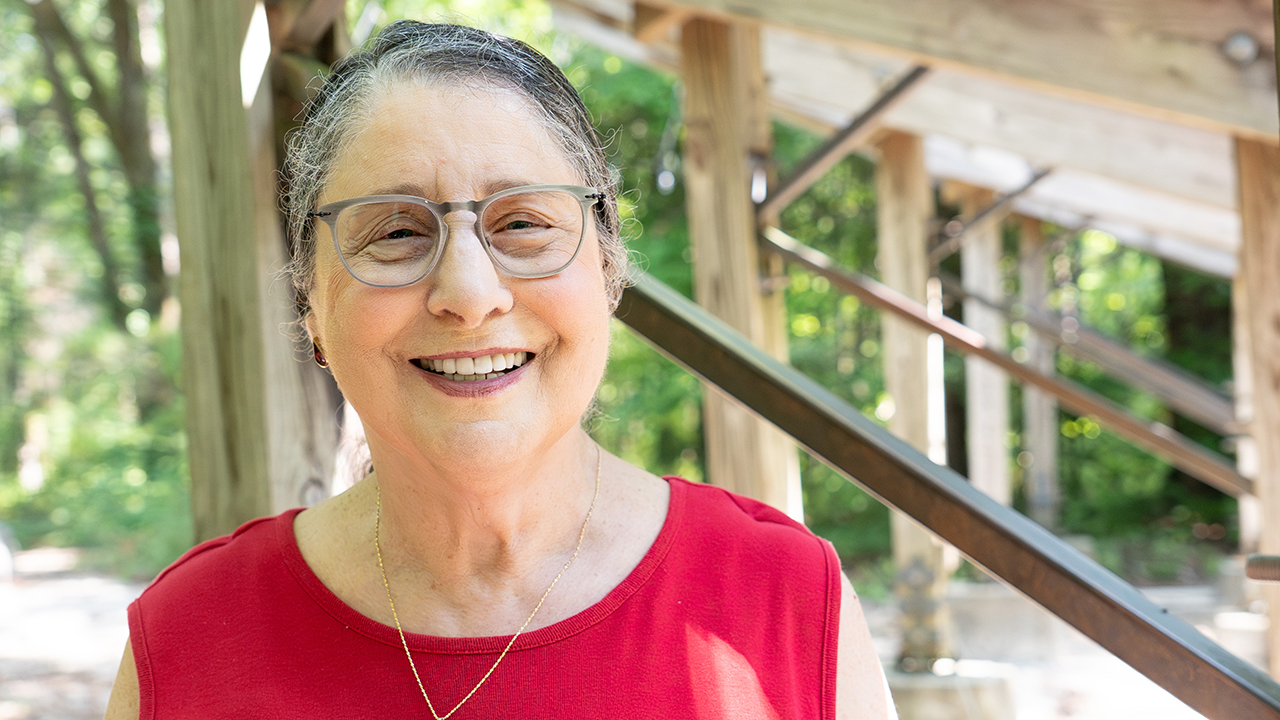content body

Emily Kling recently made a gift to support the new Environmental Education Building at the Kreher Preserve and Nature Center.
At 6 years old, Emily Kling caught the nature bug. Her hikes with her grandfather were her gateway to the natural world when she was growing up in Huntsville in the 1950s.
“There’s a picture that my grandmother took on the hottest day of the year,” Kling said. “My grandfather is shirtless with a bandana around his head. Well, there’s little Emily right next to him, shirtless with a bandana around her head. I have the most wonderful memories of those hikes with my grandfather.”
Those experiences helped shape her lifelong love of nature and eventually her career. Kling spent more than 30 years working with 4-H and Cooperative Extension as a county agent and state specialist in Kansas and Alabama, as well as a national project leader in Washington, D.C., before retiring from Auburn University with the Alabama Cooperative Extension System in 2010.
Now, she is a trusted volunteer with Auburn’s 120-acre Kreher Preserve and Nature Center (KPNC) and a major philanthropic partner helping to make the outdoors more accessible to a new generation of nature lovers.
“I think the KPNC can help create memories like I have hiking with my grandfather,” Kling said. “We want people and families to come out here and go hiking and participate in educational programs. We’re trying to develop a population in the Auburn area that appreciates the natural environment and wants to preserve what we have.”
A career in the natural world
After studying field biology at Principia College, a private liberal arts college in Illinois, Kling decided to further her education at the University of Michigan with a master’s degree in environmental education instruction, graduating in 1979.
It was then that she got her first big job — and broke a glass ceiling in the process.
When Kling joined the Kansas Cooperative Extension Service, she became the first female 4-H Natural Resources Specialist in the United States.
After 12 years as an environmental educator in Kansas, Kling was offered a two-year assignment to help develop the national 4-H Environmental Stewardship program. After that, she decided to head home to Alabama and jumped at the opportunity to become an environmental agent in Baldwin County, where she worked primarily in water quality education.
In 1997, she transferred to Auburn University to work with the Alabama Extension 4-H program and took charge of programming statewide, including for forestry, wildlife management and environmental issues. Working at Auburn also allowed her to go back to school, where she earned a doctorate in higher education administration and became the only Auburn graduate in a family full of Alabama alums.
After retiring from Auburn, Kling spent the next 10 years working as a Camp Mom and staff leadership trainer at a summer camp in North Georgia, until the COVID-19 pandemic ended that in 2020.
Finding a niche at the KPNC
After moving back to Auburn, Kling found herself facing a predicament that many felt during the early stages of the pandemic: how does one find purpose during this strange time and not go stir crazy?
It was then that she got plugged back in with volunteer work at the KPNC, where she previously volunteered and has been a longtime board member. Kling does a little bit of everything, from maintaining bird feeders to keeping storage rooms organized and helping with events.
“Emily is like this anchor that keeps the whole place coordinated and running smoothly,” said Michael Buckman, the KPNC’s manager.
Kling recently took her support of the KPNC to a new level with a substantial gift in support of the new Environmental Education Building, which will have grand opening festivities Dec. 6-8.
Using a revolutionary cross-laminated timber product, the new building will be seamlessly integrated with the natural world around it and serve as a central hub for KPNC’s everyday programming, its nature preschool and other special events.
Kling’s gift is being honored with the naming of the Emily Kling Discovery Corridor, a walkway where visitors will be able to see the KPNC’s amphibians and reptiles, in addition to a variety of interpretive and engaging environmental education displays. The animal ambassadors are currently locked away in a private office and not easily accessible for visitors.
“With the new building, the public can see them whenever they want, and that, I thought, would be a good way to expand the knowledge that we have here at the KPNC,” Kling said.
Buckman appreciates Kling’s investment in the new Environmental Education Building and thinks the space is a fitting tribute to her career and background.
“It's so appropriate for her name to be on the Discovery Corridor because it's the space that links people most directly with nature,” he said.
For Kling, it made sense to support a cause so near to her heart by using a tax-advantaged Qualified Charitable Distribution (QCD) from her IRA. Because she was required to pull funds out of her IRA, her QCD allowed her to make a gift to the KPNC while avoiding an unnecessary tax bill.
“The QCD method made it very easy to transfer some stock to the Auburn University Foundation,” Kling said.
Through her philanthropy and loyal service to the KPNC, she hopes today’s generation of children will make memories with their parents and grandparents, much like she did when she was young. And most of all, she wants people to experience the calm and sense of joy that the natural world can provide.
“I just like coming out here, and I want other people to enjoy what I get to enjoy,” Kling said.
Naming opportunities are still available!
Learn More



